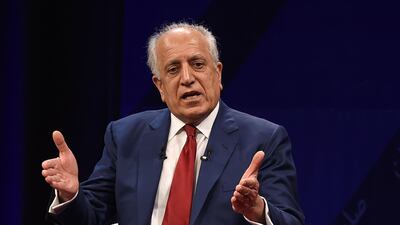The US envoy with the responsibility of forging a peace deal with the Taliban in Afghanistan said on Saturday that America stood ready for "all sides" to lay down arms in the 17-year conflict.
Zalmay Khalilzad is leading the latest round of talks with the Taliban in Doha, hoping for an agreement that would lead to foreign forces leaving Afghanistan in return for Taliban security guarantees.
"All sides laying down arms is the outcome of any peace process," Mr Khalilzad tweeted.
"All sides agreeing to reduce violence is a necessary step towards achieving that outcome and the morally responsible choice to make. We stand ready."
Mr Khalilzad's comments come a day after Afghan President Ashraf Ghani said he was prepared to call an immediate and permanent ceasefire, which the Taliban rejected.
Mr Ghani had also offered to release 175 prisoners as a goodwill gesture, as momentum builds in various Afghan peace talks.
Thousands of tribal elders, politicians and community representatives met last week at a massive Loya Jirga council summit in Kabul, which ended with a demand for a ceasefire between government and Taliban forces.
Neither the US nor the Taliban, who have met six times in recent months, have said much about progress in their latest talks, which were continuing on Saturday.
But Taliban spokesman Zabihullah Mujahid on Friday tweeted that the US should "forget about the idea of us putting down our arms".
Mr Khalilzad has repeatedly stressed that nothing would be finalised until two key issues – a ceasefire and talks between Afghan society and the Taliban – have been addressed.
Suhail Shaheen, a Taliban political spokesman, said efforts were under way to resolve differences on security and troop withdrawal.
Mr Shaheen said the other key points of a comprehensive ceasefire and Afghan dialogue could not be addressed until those first two points were agreed on.
But last year, the Taliban announced a three-day ceasefire at the end of Ramadan after Mr Ghani declared a unilateral truce for eight days earlier in the month.
It was the first formal nationwide ceasefire since the US-led invasion of 2001 and led to unprecedented scenes of reconciliation and jubilation across the country.
The insurgents have refused to talk to Mr Ghani, who they regard as a US puppet, and discussions so far have cut out his government.
Meanwhile, Afghanistan's war rages on, with thousands of civilians and fighters being killed each year.
US forces continue to train Afghan troops and strike the Taliban from the air to push the war to a political settlement.

